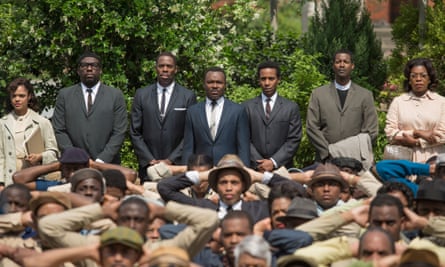It is “invaluable” that British children learn about black history in school, Selma star David Oyelowo has said.
The 38-year-old actor said Britain prided itself on being a multicultural society, and youngsters should learn about this key aspect of its past.
In an interview with the Africa Channel, posted on YouTube, Oyelowo said it was his hope that pupils are taught the full story of black history in Britain, such as colonialism and racism and not just the “nice bits”.
His comments came in response to a question about an e-petition calling for black history to become a compulsory part of the curriculum for primary school children.
“I think it’s more than important, I think it’s invaluable,” Oyelowo said. “Black people are a part of the fabric of this nation. We pride ourselves now on being a multicultural society; it is outmoded and outdated to remove black history from schools because, like I say, it is a very real part of British history and British culture.
“My hope would be that we don’t just put in the nice bits, we put in the not so nice bits as well, which are very real, in terms of colonialism, in terms of racism, in terms of the things that happened in the past in this country. Not because we want anyone to feel bad about the past, but so that we don’t make the same mistakes going forward.”
The e-petition, which closes at noon on Tuesday, has attracted more than 43,300 signatures. It says black history “helps to enrich the development of the spiritual, moral, social and cultural needs of all ethnic groups”, adding that the subject should be a mandatory element of the primary curriculum.
The petition was established by Stephanie Pitter, a 46-year-old mother of four from Birmingham, who began the campaign in 2012. “I set it up because my children came home without any form of black history in their schools, and I found that most schools in the area weren’t teaching black history. Sometimes just 10 minutes in assembly would be dedicated to Black History Month.

“If it’s part of the history curriculum it certainly would make a world of difference, not only to black children but to all ethnic groups as well.”
As the e-petition has gained more than 10,000 signatures, it has received a reply from the government. It said pupils should learn about different cultures as part of a broad curriculum, and that the new structure and content of the new history curriculum “provides plenty of scope for black history to be covered”. This is not prescribed in detail, but schools have the flexibility to deal with these topics in ways they think are appropriate for their pupils, the response said.
Pitter, who also runs the website blackhistoryinschools.uk, said it was “phenomenal” that the campaign had attracted the attention of high-profile individuals such as Oyelowo.
The former Spooks actor left Britain in 2007 to pursue his career in the US, landing a number of big-screen roles including as Martin Luther King in the new Hollywood film Selma.
Last week he criticised TV bosses for ignoring the real picture in British history by failing to cast black actors in period dramas. He told Radio Times magazine that the dearth of roles in Britain for black actors had left him and his contemporaries frustrated.
“There’s a string of black British actors passing through where I live now in LA. We don’t have Downton Abbey, or Call The Midwife, or Peaky Blinders, or the 50th iteration of Pride And Prejudice,” he said. “We’re not in those. And it’s frustrating, because it doesn’t have to be that way. I shouldn’t have to feel like I have to move to America to have a notable career.”
He added: “We make period dramas here [in Britain], but there are almost never black people in them, even though we’ve been on these shores for hundreds of years.
“I remember taking a historical drama with a black figure at its centre to a British executive with green-light power, and what they said was that if it’s not Jane Austen or Dickens, the audience don’t understand. And I thought: ‘Okay, you are stopping people having a context for the country they live in and you are marginalising me. I can’t live with that. So I’ve got to get out’.”
A Department for Education spokesman said: “Black history is firmly in the curriculum. Individuals like Mary Seacole and Rosa Parks, plus Britain’s transatlantic slave trade and the migration of people to, from and within the British isles are all explicitly mentioned in the new curriculum which came in to force in September 2014.”

Comments (…)
Sign in or create your Guardian account to join the discussion